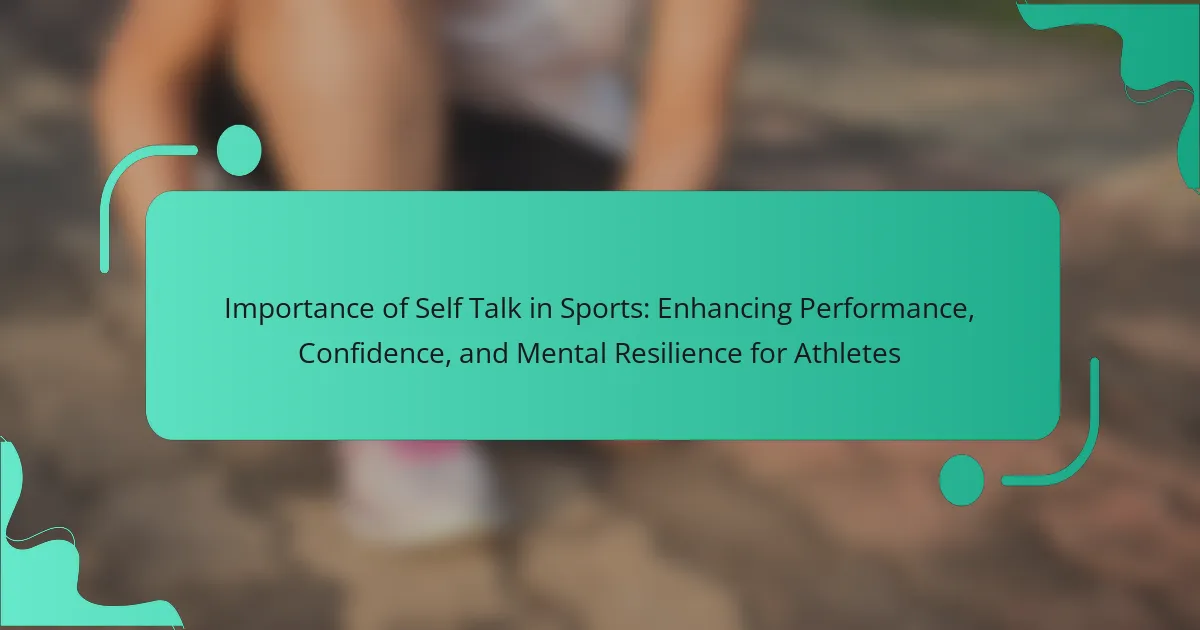Self-talk is vital for athletes, enhancing performance, confidence, and mental resilience. Positive self-talk improves focus and reduces anxiety during competition. Techniques like visualization and affirmations empower athletes to cultivate a constructive mindset. Establishing a consistent self-talk routine further solidifies these benefits, enabling athletes to overcome challenges and reach their peak potential.

Why is Self-Talk Crucial for Athletes?
Self-talk is crucial for athletes because it enhances performance, builds confidence, and fosters mental resilience. Positive self-talk helps athletes focus, manage stress, and maintain motivation during training and competition. Research indicates that athletes who engage in constructive self-talk experience improved outcomes, such as increased endurance and reduced anxiety. This mental strategy empowers athletes to overcome challenges and maintain a competitive edge. By consciously shaping their inner dialogue, athletes can effectively boost their overall performance and mental toughness.
How Does Positive Self-Talk Impact Performance?
Positive self-talk significantly enhances athletic performance by boosting confidence and mental resilience. Athletes who engage in positive self-talk experience improved focus and reduced anxiety during competitions. Research shows that positive affirmations can lead to a 20% increase in performance metrics. This mental strategy fosters a growth mindset, allowing athletes to overcome challenges more effectively. Ultimately, positive self-talk cultivates a supportive internal dialogue that is crucial for peak performance in sports.
What Role Does Self-Talk Play in Building Confidence?
Self-talk significantly boosts confidence by shaping an athlete’s mindset. Positive self-talk enhances focus, reduces anxiety, and reinforces belief in abilities. Research shows that athletes who engage in constructive self-talk perform better under pressure. This mental strategy fosters resilience, enabling athletes to recover from setbacks and maintain motivation. Ultimately, effective self-talk transforms an athlete’s performance by instilling confidence and promoting a winning mentality.
How Can Self-Talk Enhance Mental Resilience?
Self-talk significantly enhances mental resilience by fostering positive thinking and self-encouragement. It helps athletes manage stress, improve focus, and maintain motivation during challenges. Research indicates that athletes who engage in constructive self-talk experience lower anxiety levels and improved performance outcomes. By reinforcing a growth mindset, self-talk becomes a unique attribute that differentiates successful athletes from their peers. This mental strategy empowers athletes to overcome obstacles and persist in the face of adversity.

What Are the Universal Benefits of Self-Talk in Sports?
Self-talk in sports enhances performance, boosts confidence, and builds mental resilience for athletes. It serves as a powerful tool for motivation and focus. Positive self-talk can improve concentration and reduce anxiety during competitions. Athletes who engage in constructive self-dialogue often experience increased self-efficacy, leading to improved outcomes in their performance. Research shows that athletes using self-talk effectively can enhance their overall mental state, which is crucial for achieving peak performance.
How Does Self-Talk Improve Focus and Concentration?
Self-talk significantly enhances focus and concentration by creating a positive mental environment for athletes. Effective self-talk helps athletes maintain motivation, manage anxiety, and reinforce confidence during performance. Research indicates that athletes who engage in positive self-talk experience improved concentration levels and better performance outcomes. By using specific phrases or affirmations, athletes can redirect their thoughts, keeping distractions at bay and sharpening their focus on tasks. This unique attribute of self-talk fosters mental resilience, enabling athletes to overcome challenges and maintain peak performance under pressure.
What Are the Emotional Benefits of Positive Self-Talk?
Positive self-talk significantly enhances emotional well-being, leading to improved performance and resilience in athletes. It fosters a positive mindset, reduces anxiety, and boosts self-confidence. Research shows that athletes who engage in positive self-talk experience lower stress levels and increased motivation. This mental strategy helps in overcoming challenges and setbacks, making it essential for peak performance. By reinforcing self-belief, athletes can maintain focus and composure during competitions, ultimately enhancing their overall athletic experience.

What Unique Strategies Enhance Self-Talk for Pro Athletes?
Unique strategies that enhance self-talk for pro athletes include visualization techniques, affirmations, and mindfulness practices. These methods help athletes cultivate a positive mindset, boost confidence, and improve mental resilience.
Visualization techniques allow athletes to mentally rehearse their performance, reinforcing belief in their abilities. For example, picturing successful outcomes can create a strong psychological foundation.
Affirmations involve repeating positive statements that counter negative self-talk. This practice can shift an athlete’s mindset, fostering a sense of control and determination.
Mindfulness practices, such as meditation, promote awareness of thoughts and feelings, enabling athletes to manage anxiety and maintain focus during competition. These strategies collectively enhance self-talk, leading to improved performance.
How Can Visualization Techniques Complement Self-Talk?
Visualization techniques can significantly enhance self-talk by creating a mental framework that reinforces positive affirmations. By picturing successful outcomes, athletes can strengthen their confidence and mental resilience. This synergy allows self-talk to be more effective, as visualization provides a concrete representation of goals, making the affirmations more relatable and achievable. As a result, athletes can better manage anxiety and improve their focus during performance. Integrating both methods fosters a holistic approach to mental preparation in sports, ultimately leading to enhanced performance.
What Are Effective Self-Talk Scripts for Different Sports?
Effective self-talk scripts enhance athletes’ performance, confidence, and mental resilience. These scripts vary by sport but generally focus on positive affirmations, visualization, and goal-setting.
For team sports like basketball, a script might include phrases like “I trust my teammates” and “I am prepared for every play.” In individual sports such as tennis, self-talk could emphasize “I control my responses” and “I am focused on my game.”
In endurance sports, athletes might use scripts that reinforce perseverance, such as “I am strong” and “I can push through discomfort.” These tailored scripts help athletes maintain a positive mindset, crucial for optimal performance.
Utilizing specific self-talk strategies can significantly impact an athlete’s mental state, leading to improved outcomes in competition.

What Rare Techniques Are Used by Elite Athletes?
Elite athletes utilize rare techniques such as visualization, affirmations, and mindfulness to enhance their performance. These methods foster mental resilience and confidence. Visualization helps athletes mentally rehearse their performance, improving focus and reducing anxiety. Affirmations promote positive self-talk, reinforcing belief in their abilities. Mindfulness practices enhance present-moment awareness, aiding in stress management during competitions. These techniques are not commonly adopted by all athletes, making them unique strategies for elite performance enhancement.
How Do Top Athletes Personalize Their Self-Talk Approaches?
Top athletes personalize their self-talk by tailoring messages that boost confidence and focus. They often use positive affirmations and specific cues to enhance performance during training and competition. Personalized self-talk strategies help athletes manage anxiety and maintain mental resilience. For example, elite runners may repeat phrases like “I am strong” to reinforce their capabilities. This unique approach allows them to optimize their mental state, leading to improved outcomes in their sport.
What Innovative Methods Are Emerging in Self-Talk Practices?
Innovative methods in self-talk practices for athletes include visualization techniques, mindfulness integration, and technology-assisted feedback. These approaches enhance performance by fostering a positive mindset, improving focus, and building mental resilience. For instance, athletes use guided imagery to envision successful outcomes, which boosts confidence. Additionally, mindfulness practices help manage stress and maintain composure during competition. Wearable technology can provide real-time feedback on physiological responses, allowing athletes to adjust their self-talk strategies effectively.

How Can Athletes Develop a Consistent Self-Talk Routine?
Athletes can develop a consistent self-talk routine by incorporating positive affirmations and structured mental cues. This practice enhances performance, builds confidence, and fosters mental resilience.
To establish a routine, athletes should identify specific situations where self-talk is beneficial, such as during training or competitions. They can create tailored affirmations that resonate with their goals and challenges. Regular practice of these affirmations can reinforce a positive mindset.
Additionally, athletes should monitor their self-talk patterns, replacing negative thoughts with constructive ones. Consistency is key; integrating self-talk into daily training can solidify this mental strategy.
Lastly, pairing self-talk with visualization techniques can amplify its effectiveness. Visualizing success while using positive self-talk creates a powerful mental framework for performance enhancement.
What Steps Can Athletes Take to Cultivate Positive Self-Talk?
Athletes can cultivate positive self-talk by practicing specific strategies that enhance their mental resilience and performance. They should first identify negative thoughts and replace them with constructive affirmations. Visualization techniques can help athletes imagine successful outcomes, reinforcing their confidence. Regular mindfulness practices, such as meditation, can improve focus and reduce anxiety. Additionally, setting realistic goals fosters a positive mindset, as athletes can celebrate small achievements along their journey. Engaging in supportive peer discussions can further reinforce positive self-talk, creating an encouraging environment.
What Techniques Help Identify Negative Self-Talk Patterns?
Identifying negative self-talk patterns involves techniques like self-monitoring, cognitive restructuring, and mindfulness. Self-monitoring requires athletes to keep a journal of thoughts during training or competition. Cognitive restructuring helps athletes challenge and replace negative thoughts with positive affirmations. Mindfulness encourages athletes to observe their thoughts without judgment, promoting awareness of harmful patterns. These techniques enhance mental resilience, ultimately improving performance and confidence.
How Can Journaling Enhance Self-Talk Practices?
Journaling significantly enhances self-talk practices by providing a structured outlet for athletes to reflect on their thoughts and feelings. This process fosters greater self-awareness, allowing athletes to identify negative self-talk patterns and replace them with positive affirmations.
Regular journaling cultivates mental resilience, as athletes can track their progress and setbacks, reinforcing a growth mindset. This practice also boosts confidence by enabling athletes to articulate their goals and visualize success, which is crucial for performance enhancement.
Furthermore, journaling serves as a tool for emotional regulation, helping athletes manage stress and anxiety associated with competition. By documenting their experiences, athletes can develop a more constructive inner dialogue, ultimately leading to improved performance outcomes.
What Common Mistakes Should Athletes Avoid in Self-Talk?
Athletes should avoid negative self-talk, unrealistic expectations, and comparisons with others. These mistakes can undermine performance and confidence. Negative self-talk creates doubt, while unrealistic expectations lead to frustration. Comparing oneself to others can diminish an athlete’s unique attributes and achievements. Instead, athletes should focus on constructive and positive affirmations to enhance mental resilience and performance.

What Are Expert Tips for Optimizing Self-Talk in Sports?
To optimize self-talk in sports, athletes should focus on positive affirmations, visualization techniques, and maintaining a growth mindset. These strategies enhance performance and build mental resilience.
1. Use positive affirmations to reinforce confidence. For example, phrases like “I am strong” or “I can succeed” can shift mindset.
2. Implement visualization techniques by mentally rehearsing successful performances. This prepares the mind for actual competition.
3. Embrace a growth mindset by viewing challenges as opportunities to improve. This approach fosters resilience and determination.
4. Monitor self-talk during training and competition to identify negative patterns. Replacing these with constructive thoughts can enhance focus and performance.
How Can Coaches Support Athletes in Developing Effective Self-Talk?
Coaches can support athletes in developing effective self-talk by teaching techniques that enhance performance and build mental resilience. They can introduce strategies such as positive affirmations, visualization, and mindfulness practices. Encouraging athletes to identify and challenge negative thoughts fosters a growth mindset. Regular feedback and discussions about self-talk create an open environment for athletes to share experiences. Additionally, incorporating self-talk exercises into training routines reinforces these skills in high-pressure situations, ultimately boosting confidence and performance.
What Resources Are Available for Athletes to Improve Self-Talk?
Athletes can access various resources to improve self-talk, enhancing performance and mental resilience. These include workshops focusing on cognitive techniques, mobile apps designed for mindfulness and positive affirmations, and books on sports psychology. Coaches can also play a crucial role by providing feedback and encouraging positive dialogue. Online forums and support groups offer community engagement for shared experiences and strategies.
How Can Athletes Measure the Impact of Self-Talk on Performance?
Athletes can measure the impact of self-talk on performance through self-assessment, performance metrics, and psychological evaluations. Tracking changes in confidence and mental resilience correlates with self-talk practices. Research indicates that positive self-talk enhances focus and reduces anxiety, leading to improved outcomes. Athletes may also use journals to document their thoughts and feelings before and after competitions, providing insight into the effectiveness of their self-talk strategies.
